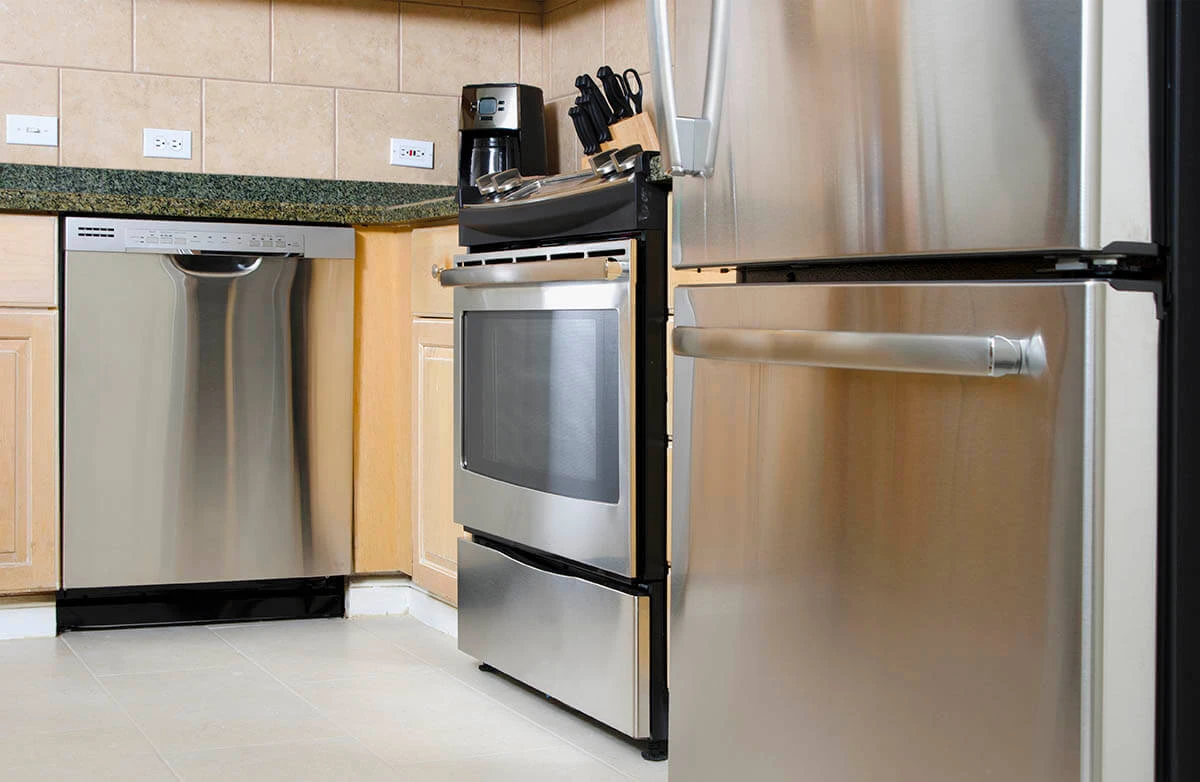Does Stainless Steel Rust?

Yes, stainless steel may develop rust when exposed to water and certain conditions. However, it does not corrode in the same manner or at the same speed as ordinary steel.
Learn what causes stainless steel to rust so you can keep your stainless appliances looking their best.
What Is Stainless Steel?
Stainless steel is a type of steel that resists most stains and corrosion, thanks to the addition of 10 to 30 percent chromium. This invisible layer of chromium helps protect the material from heat, moisture, and chemicals, which makes stainless steel a superior finish for household appliances.
When normal steel is exposed to oxygen, it reacts to form ferric oxide, giving it the traditional rust color. But when stainless steel is exposed to oxygen, the chromium molecules react by forming a thin layer of chromium oxide, which prevents further oxidation. As long as there are sufficient volumes of chromium and oxygen, stainless steel effectively heals itself from minor damage, making it rust-resistant.
Why Does Stainless Steel Rust?
Despite the winning properties that make stainless steel one of the most long-lasting, durable materials, rust may still form if the chromium layer is broken down by water, mechanical abrasions, chloride, or another chemical reaction.
There are three common types of stainless-steel corrosion:
1. Crevice Corrosion
Small pits may form in the stainless steel from exposure to water, salt, food, or other materials that are high in chloride. If these crevices in the chromium layer are too small for oxygen to access, then the steel underneath may react with various elements and cause rust to form.
2. Galvanic Corrosion
This type of corrosion happens when two dissimilar metals contact each other and sufficient moisture is present. For example, if a bolt or other metal component is attached to stainless-steel components, the steel may corrode.
3. General Corrosion
General corrosion may occur when the stainless-steel surface comes into contact with an acid-based material such as those found in many common household cleaners.
How to Prevent Stainless Steel from Rusting
Check the owner's manuals for your stainless-steel appliances, and adhere to the care instructions to maintain their integrity and appearance. These are some general rust prevention tips:
- Regularly clean your stainless-steel appliances using mild soap or a cleaner formulated for safe use on stainless steel.
- Wipe with a clean, soft cloth in the direction of the grain.
- Dry completely after cleaning.
- Check the ingredients on cleaners you use near your appliances, such as floor or grout cleaner, as they may off-gas or splatter onto the steel.
- Never use steel wool or a scouring pad to clean stainless-steel appliances, as you may scratch the surface.
There are protective coating products available for stainless steel, but appliances are thoroughly treated during manufacturing, so you shouldn’t need these extra products if you take care of your appliances correctly.
How to Remove Rust from Stainless Steel Appliances
Have rust on your appliances already? Try one of these methods to get rid of it before it spreads:
- Mix 1/2 tablespoon of baking soda with a cup of water. Use a soft cloth to rub the mixture into the rusted areas in the direction of the metal grain. Rinse and dry the area completely.
- Use the same method as above, but swap the baking soda for a gentle, powdered oxalic acid cleaner.
- Mix a tablespoon of cream of tartar with a squeeze of lemon juice. Using this paste, gently scrub the rust with a soft cloth in the direction of the grain. Rinse the area at least twice with clean water before drying it fully.
Have rust problems in your bathroom too? Try these sink and toilet rust removal tips from Mr. Rooter® Plumbing, our fellow Neighborly® home service brand.
 Click to call
Click to call


